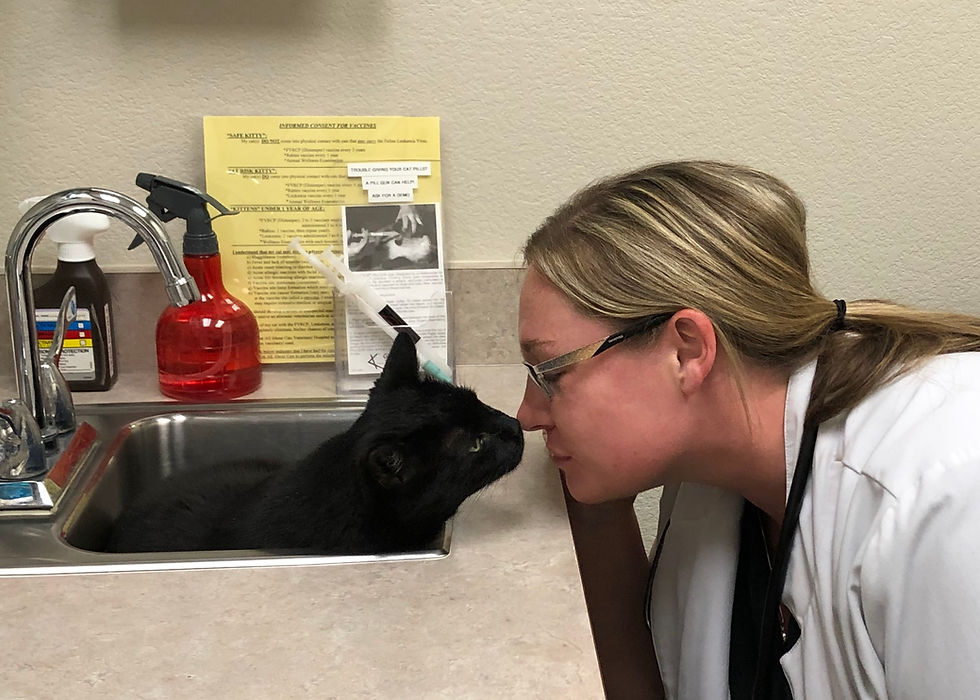Feline Infectious Peritonitis: Understanding, Diagnosing, and Treating This Once-Fatal Feline Disease
- thecathospitallv
- Aug 13, 2025
- 3 min read
Updated: Aug 29, 2025
Feline Infectious Peritonitis (FIP) is a serious and historically fatal disease in cats that has challenged veterinarians and devastated pet owners for decades. Today, however, the landscape of FIP treatment is changing. Once viewed as a hopeless diagnosis, FIP is now considered treatable—and in many cases, curable—thanks to groundbreaking medical advances and dedicated feline-focused practitioners.
In this article, we explore what Feline Infectious Peritonitis is, how it develops, its symptoms, how it's diagnosed, and how experts like Dr. Ashley Love at Las Vegas Cat Hospital are successfully treating this disease and saving lives.
What Is Feline Infectious Peritonitis?
Feline Infectious Peritonitis is a viral disease caused by a mutation of the common feline coronavirus (FCoV). While most strains of feline coronavirus are harmless and often go unnoticed, in some cats the virus mutates into a highly aggressive form that causes a systemic and often deadly condition known as FIP.
The disease primarily affects young cats, cats living in multi-cat environments, or those with weakened immune systems. FIP is not contagious in its mutated form, but because the benign form of feline coronavirus is so widespread, it poses a risk to cats in densely populated environments such as shelters, catteries, and rescue homes.
Forms and Symptoms of FIP
There are two main forms of Feline Infectious Peritonitis—each with distinct clinical features:
1. Effusive (Wet) FIP
This form is characterized by fluid accumulation in the abdomen or chest, leading to symptoms such as:
Swollen abdomen
Difficulty breathing
Fever that doesn't respond to antibiotics
Lethargy and loss of appetite
2. Non-Effusive (Dry) FIP
In this form, there is no fluid buildup. Instead, granulomatous lesions form in organs like the brain, eyes, liver, or kidneys, resulting in:
Neurological signs (e.g., tremors, seizures, ataxia)
Ocular issues (e.g., inflammation, vision loss)
Weight loss and persistent fever
Because these signs can mimic other conditions, accurate diagnosis is essential.
Diagnosing Feline Infectious Peritonitis
Diagnosing Feline Infectious Peritonitis is notoriously complex. There is no single, definitive test for FIP, and veterinarians typically rely on a combination of diagnostic tools, including:
Blood tests to identify elevated protein levels or anemia
Fluid analysis (in wet FIP cases)
Imaging studies (ultrasound, X-rays)
PCR testing on fluid or tissues for feline coronavirus
Biopsy or histopathology
Veterinary expertise is crucial, as many of the symptoms can resemble other feline diseases.
Treating Feline Infectious Peritonitis: A New Era of Hope
Until recently, Feline Infectious Peritonitis was considered untreatable, with most cats succumbing to the disease within weeks. Today, however, the introduction of antiviral therapies has transformed the prognosis for FIP-positive cats.
GS-441524: The Antiviral Breakthrough
The most significant advancement in FIP treatment has been GS-441524, a nucleoside analog that effectively stops viral replication. This medication has been used with high success rates in both wet and dry forms of FIP.
Cats treated with GS-441524 often show improvement within days—gaining energy, regaining appetite, and reducing symptoms dramatically over a 12-week period of therapy.
However, access to GS-441524 can be limited in some areas due to regulatory restrictions, which is why it's essential to work with a qualified veterinary provider experienced in FIP management.

Dr. Love at Las Vegas Cat Hospital: Leading the Way in FIP Treatment
If you are searching for effective, compassionate, and expert care for Feline Infectious Peritonitis, Dr. Ashley Love at Las Vegas Cat Hospital is at the forefront of FIP treatment and recovery.
With a deep understanding of feline-exclusive medicine and years of experience treating FIP cases, Dr. Love has helped numerous cats survive—and thrive—after an FIP diagnosis. The team at Las Vegas Cat Hospital offers:
Accurate diagnostic services to confirm FIP
Access to proven antiviral therapies, including GS-441524
Ongoing monitoring and support throughout treatment
A feline-friendly environment tailored to reduce stress and promote healing
Dr. Love's success in treating Feline Infectious Peritonitis has made Las Vegas Cat Hospital a trusted name among cat owners both locally and nationally. Their commitment to evidence-based medicine and personalized care offers hope where there once was none.

Final Thoughts
Feline Infectious Peritonitis no longer has to be a death sentence. With accurate diagnosis, timely intervention, and expert veterinary care, many cats now go on to live full, healthy lives after FIP.
If your cat has been diagnosed with FIP or is showing concerning symptoms, don’t wait. Contact Dr. Love at Las Vegas Cat Hospital to explore the latest, life-saving treatment options. Hope and healing are possible—and they're closer than you think.




Comments